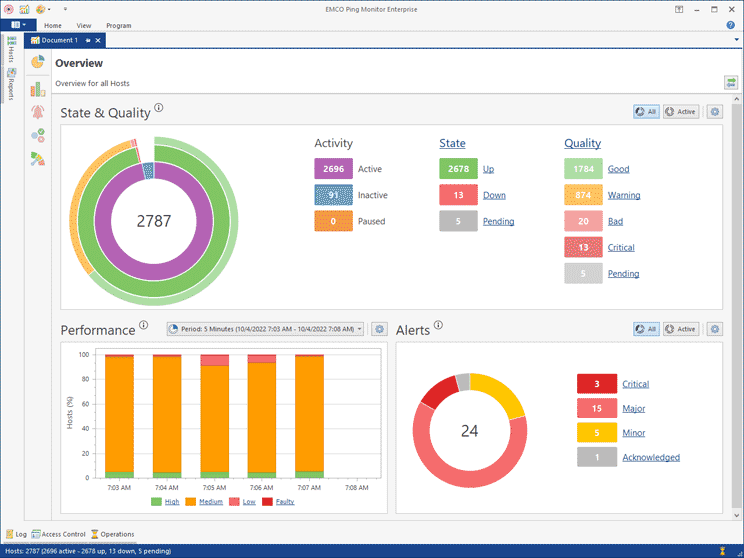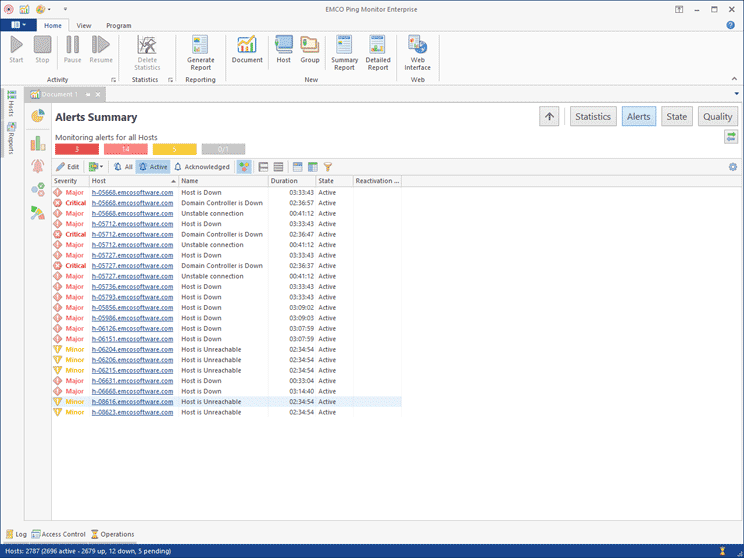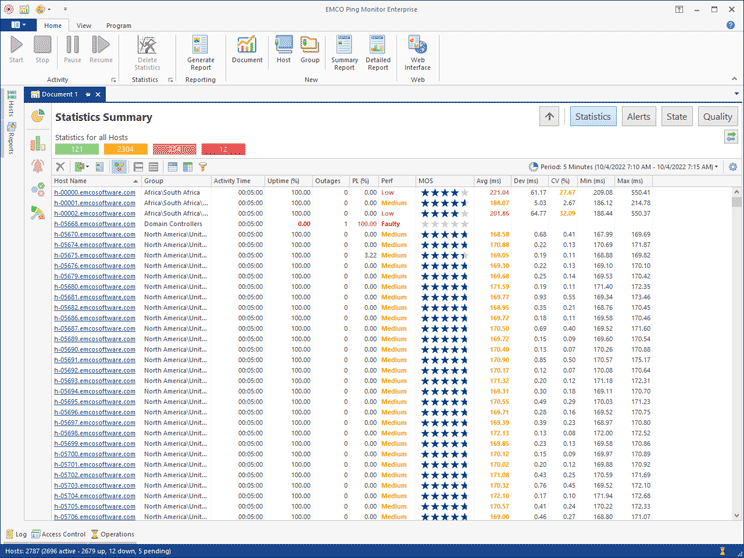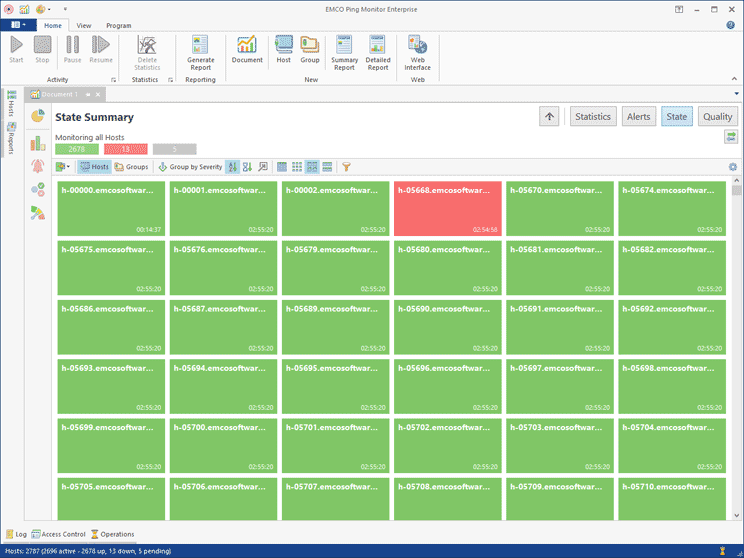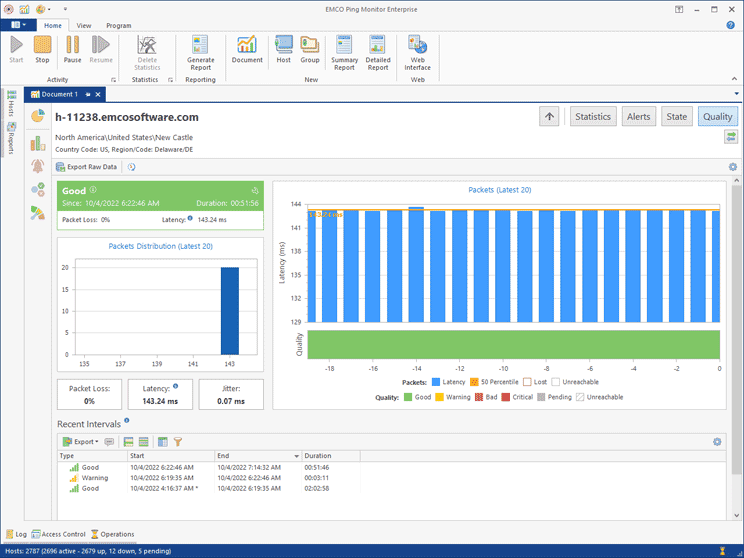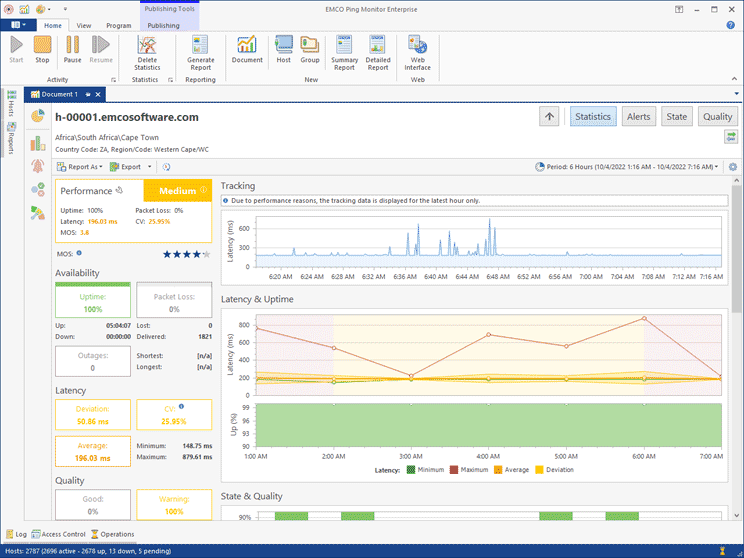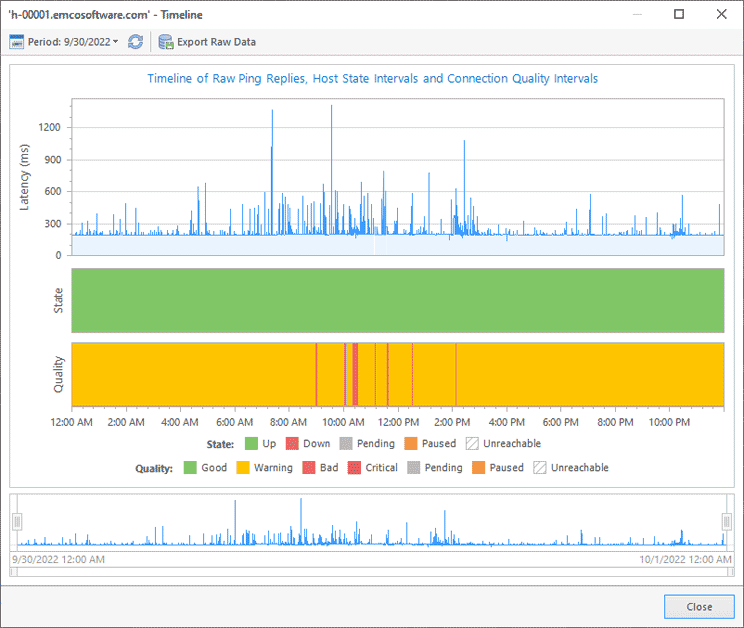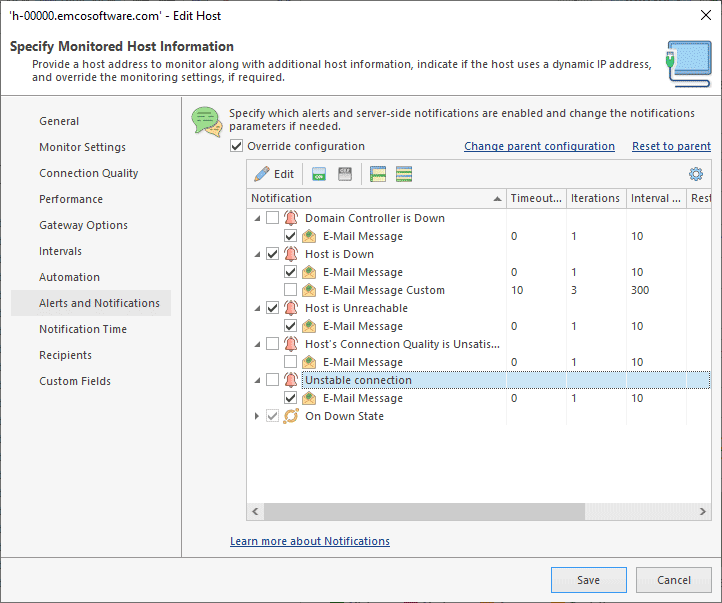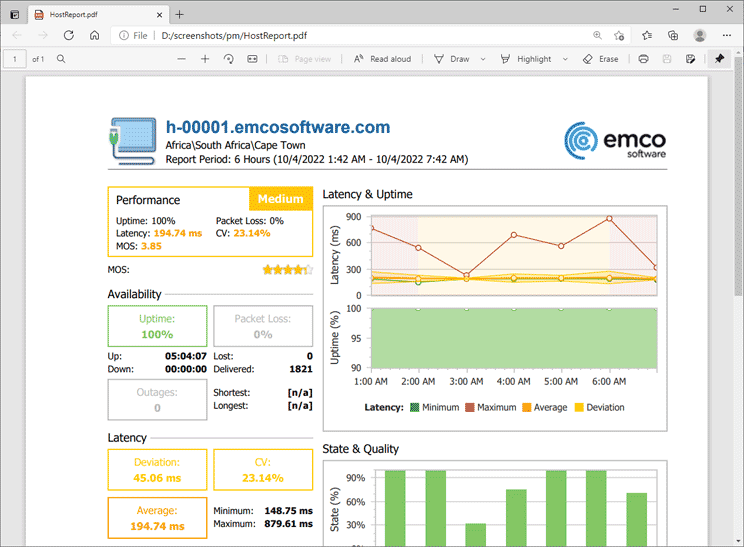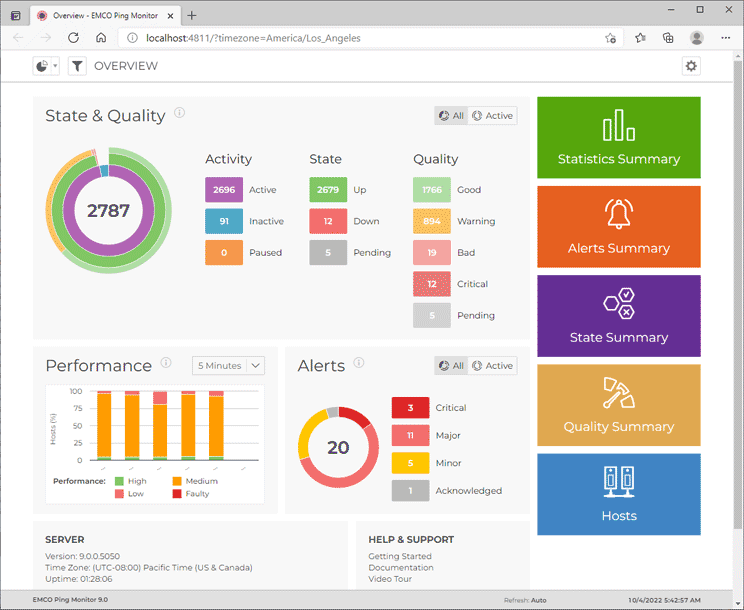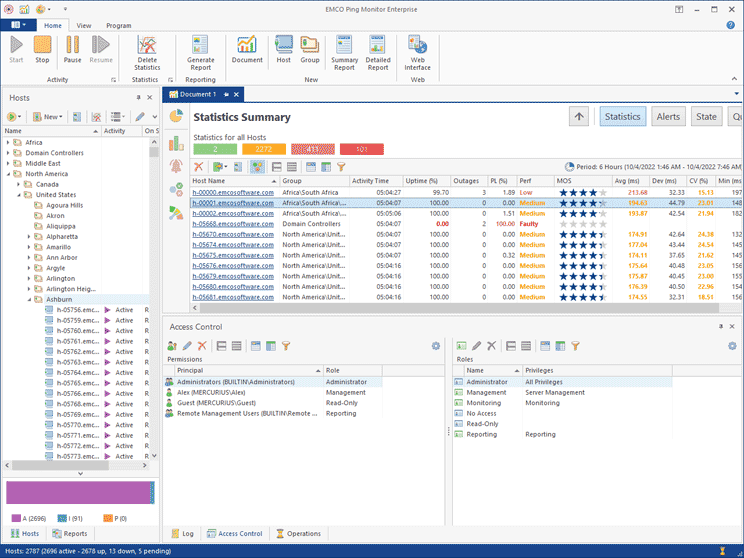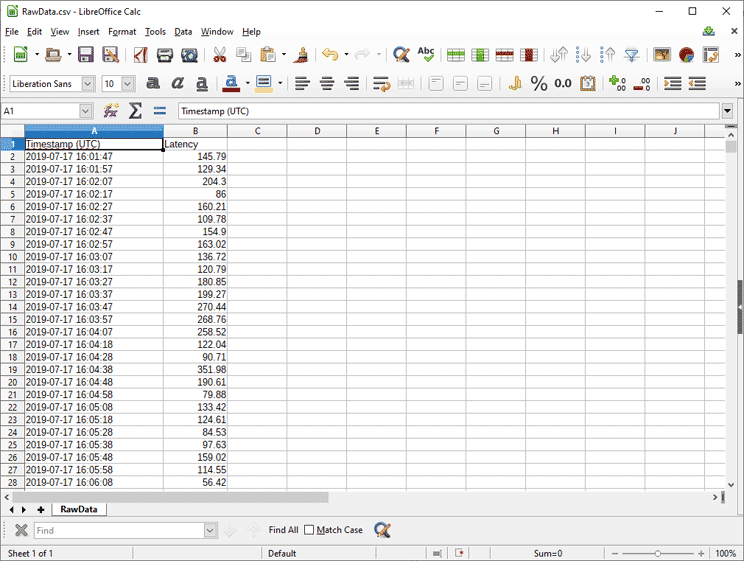Why EMCO Ping Monitor
Use a network monitoring tool that includes all the features - it monitors hosts, detects status changes and connection quality, sends notifications, stores statistics and generates reports.
Monitor Up to 8.000+ Hosts
Monitoring performance is important, so the program is optimized to work with any number of hosts - starting from 1 and up to 8.000+ hosts on a single server. Optimizing performance
Host State and Connection Quality Tracking
The program uses ICMP pings to track state (up/down) and connection quality (the real-time characteristics based on packet loss percentage, latency percentile and jitter) of each monitored host. More about tracking
High-Precision Latency Measurement
The program uses ping latency measurement with 0.01ms precision. It allows to provide precise measurements in low-latency networks. More about monitoring
Detailed Statistics
Every ping is recorded by the program, so you can see each ping latency for any host and selected reporting period. The program also provide aggregated statistics for historical periods. Statistics explained
Hosts Monitoring Scenarios
EMCO Ping Monitor is an advanced monitoring tool that tracks hosts statuses in real-time, sends notifications, generates reports and provides access to the detailed statistical data.
Up/Down State Detection
The program pings each monitored host regularly to detect whether it is up or down. Host states are displayed on screen, state changes are registered and notifications are sent, so you are informed about all changes and can find required info easily.
You can tune all monitoring parameters, such as an interval between pings and host state changes conditions.
Real-Time Connection Quality Audit
The program automatically calculates connection quality metrics in real-time based on packet loss percentage, latency percentile and packet delay jitter to classify connection to each host as good, warning, bad or critical.
The detected connection quality is displayed for each host on screen. When connection quality to a host changes, the program sends a notification.
Historical Statistics Analysis
Get detailed monitoring statistics for any historical reporting period. The program uses uptime percentage, packet loss percentage, average latency, latency deviation, CV to analyze host performance for the selected period.
You can also get the list of outages detected by the program for the host in the analyzed historical period, so you can know when host was up and down.
Flexible Notifications
Let the program work automatically to monitor hosts and notify you only when changes happen. Multiple notification types are supported, including e-mails, system tray notifications and sounds.
You can configure the program to send notifications only on selected events, for example, when hosts go up and down, when connection quality changes. Repeated notifications are also supported.
Reports Generation
Do you want to get detailed statistics for monitored hosts? The program generates two types of reports automatically on schedule in different formats and can send them by e-mail or upload to an FTP server.
A report includes detailed statistics for each host for the reporting period and includes latency chart, list of outages, min/max/avg values, etc.
Raw Ping Data Access
Every ping is recorded by the program for each host. When you need to investigate a networking problem you can open timeline and see raw ping results for a host.
The program provides easy navigation so you can select an interval and then locate a time range to inspect pings. You can export raw ping data into a file, if required.
How Host Monitoring Works
EMCO Ping Monitor works automatically to track hosts statuses 24/7 and notify you if any problems are detected.
Hosts Configuration
To start using the program you need to specify hosts to be monitored. You can add hosts one-by-one by specifying a host name or an IP address. Alternatively you can specify an IP range to add hosts or import hosts from a file. Hosts can be organized in groups. If required, you can change monitoring settings and apply custom settings for a host or a group.
Automatic Monitoring
Once you add hosts, the program starts their monitoring. The program uses ICMP pings to send echo requests and receive echo replies to each monitored host regularly. If a host replies, the program saves ping latency data to be used for calculating host statistics and real-time connection metrics. If a host doesn't reply on time, the program registers that as a failed ping.
Problems Detection
The program detects a host outage by tracking failed pings. If the particular number of pings are failed in a row, the program changes the host state to down. When pings echo replies are delivered again, the program changes the host state to up. You can customize ping intervals and outage condition, if required.
Notifications Sending
When a host state or connection quality changes, the program can send you e-mail notifications, play a sound and show system tray notifications - you can select what type of notifications you need. The program supports recurrent notifications. For example, you can configure to send e-mails regularly while a host is in the down state.
Reports Generation
If you need a report, the program can generate it automatically. It is possible to configure reports generated on demand and reports generated automatically on the regular basis, for example, every day. You can select hosts that should be included into a report, select reporting period, output format and other settings.
Statistics Auditing
The program allows you to check real-time metrics of the host and its statistics for any historical period. Monitoring results are saved and aggregated automatically, so you can check a host statistics for a month, week, day or another period, including latency min/max/avg, CV and other metrics. You can also review raw ping results, if you need.
Host State Monitoring
The program automatically monitors host state to detect whether the host is up or down by pinging the host on the regular basis. If the host doesn't reply on ping requests, the host state is changed to down and corresponding notifications are sent.
Connection Quality Tracking
Continuous host pinging and analyzing latency allows to the program to measure real-time connection characteristics and classify the connection quality as good, warning, bad or critical. Packet loss and jitter metrics are used to measure connection quality.
Client/Server Architecture
The program works as client/server. You can install the server and client on different machines. The server performs host monitoring, collects statistics and generates reports. The client connects to the server and is used to configure monitoring and display data. Multiple clients can work with one server simultaneously.
Run as Windows Service
Ping Monitor server works as a Windows service. It starts automatically when the server is started and monitor hosts even if there is no active Windows user sessions. After server restart it continue monitoring the same hosts that were monitored before the restart.
Monitoring Web Interface
In addition to the full-featured GUI client, the program also provides the monitoring web interface, that allows to review monitoring information. You can use it to start/stop monitoring and also to review host status, connection quality and statistics.
High-Precision Latency Measurement
The program provides a special monitoring module to replace the standard ping latency measurement with 1ms precision. The high-precision measurement has 0.01ms precision and allows using the program to monitor hosts in low-latency networks.
Views for Control Rooms
Do you want to see status of all monitored hosts on a single screen? The program has special views that allow to display host state and connection quality information for all hosts on a single screen. Use data sorting, grouping and filtering features to display important info.
User Access Permissions
Restrict access to the program using roles and permissions. Roles describe privileges in the program to perform specific actions. You can assign this roles to Windows users and groups to provide access for them to specific features in the program.
Individual Settings for Hosts/Groups
Override global settings and apply specific settings for a host or group. This feature allows you to set custom monitoring settings for a specific host, for example. Or you can set e-mail recipient addresses for a group and all notifications will be sent to these addresses for all hosts in the group.
Notifications
The program can send notifications when a host goes up and down or when connection quality changes. It is possible to send e-mail notifications, play sound alerts and show system tray messages. You can select a notification type and events when notifications should be sent. Repeated notifications are supported.
Custom Actions
Integrate the program with other software using custom actions. The program allows executing a script or an executable when host state or connection quality changes. You can configure custom actions for all hosts or for a specific host or group.
Reports
Configure the program to generate a report on demand or on schedule. The report includes detailed host statistics for the reporting period. Reports can be generated in HTML and PDF formats and can be automatically sent by e-mail to specified recipients.
Select the Program Edition
The program is available in multiple editions with the different set of the features.
Compare Editions
- Monitoring of 5 hosts
- No individual settings for hosts
- Latency measurement precision: 1 ms
- Statistics for the last 30 days only
- 1 connection to the server
- Monitoring of 250 hosts
- Common and individual settings for hosts/groups
- Latency measurement precision: 0.01 ms
- Statistics with no time limit
- 2 simultaneous connections to the server
- Monitoring of unlimited hosts
- Common and individual settings for hosts/groups
- Latency measurement precision: 0.01 ms
- Statistics with no time limit
- Unlimited simultaneous connections to the server
- Optimized interface for host state and connection quality monitoring
- User access permissions
Can I use the downloaded version for free?
During the first 30 days since the installation the program works as the Enterprise edition in trial mode, so you have access to all available features.
After expiration of 30-days trial the program is reverted to Free edition, so you can keep using the features available in this edition or order a license and register the product to enable features available in the Professional or Enterprise editions.
Can I get an SMS when a host goes down?
The program doesn't has built-in SMS module, but if you have a software that can send SMS, you can integrate Ping Monitor with this software. Use a custom action to execute a script or executable when a host goes down and notify the external software to send an SMS. Learn how to use custom actions on this page.
What is the difference between the program editions?
How many hosts can be monitored?
The number of hosts depends on the used edition of the program:
- The Free edition allows monitoring of 5 hosts.
- The Professional edition allows monitoring 250 hosts.
- The Enterprise edition doesn't have any license limitations. The number of monitored hosts depends on the used hardware. Using modern hardware it is possible to monitor 8.000+ hosts. Technological limit is 32.000 hosts.
The evaluation version of the program works as the Enterprise edition during 30 days, so there are no limitation for a number of hosts.
What hardware configuration is required?
What type of support do you provide?
Ready to get started?
Install a free, full-featured 30-days trial version and see how it works in your network environment.
